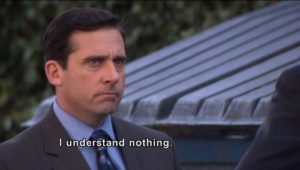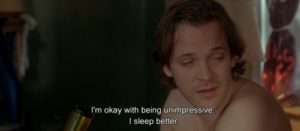My Core 3 class is Life Story. It’s not a required class, but I feel like it should be. The class talks a lot about the process of growing up, growing old, and becoming an adult- or emerging adult, as the newfound psychological term goes. An emerging adult is a new demographic outline that encapsulates people between the ages of 18 and 25, who are not quite adults or adolescents. Us emerging adults are classified by our experiences of instability and newfound possibilities. The fact that the term “adult” is used to define the term- instead of, say, “departing adolescent,” is a semi-terrifying fact in itself. Most of the time, I don’t feel like an adult. I feel like this.
The class helps me not feel like this. The last class we had focused on career identity, and the way that ones career should align with an individual’s sense of self. We learned that the typical ideal for a job is an “identity-based work,” a job that you believe makes the most of your talents and interests and that you look forward to each day. Our professor asked us what type of job we would like to have, in-terms of a long-term career. Surprisingly, I hadn’t really thought about what it was that I specifically wanted to do. I just said that I would want to be a job where the people I was working with are cool, creative people doing cool, creative things. I didn’t want to be in a community of freelance writers, per-say, but just in a job that challenges me.
The class responded: “So…what are you going to do?” as if I had answered nothing. I said, “Well, maybe I’ll work in a museum, or something like that,” and the professor moved on to the next student. The answer of my classmates and my professor surprised me, however, and made me realize that I had to think deeper about what exactly it was that I really wanted to do. A lot of my classmates at Scripps had already come from places where people pursuing their individual passions, or some type of creative pursuit, already surrounded them. Meanwhile, I came from a mundane town on the east coast, where not a lot of people were doing things like that. I feel honored just to be at Scripps, and to be around the type of people that go here. My hometown is like the town in Garden State. Like, it’s literally twenty minutes away from where it was filmed. It’s weirdly accurate.
Anyway, I’m realizing that I have to start seeing my career as something besides a way of getting out of New Jersey; it’s more than just a survival tactic. Luckily for me, the next part of the class was about how internships, and even minimum wage jobs, can help explore one’s sense of “career identity.” Hopefully, this means that I can avoid resorting to “what career are you?” tests over the next few years.



